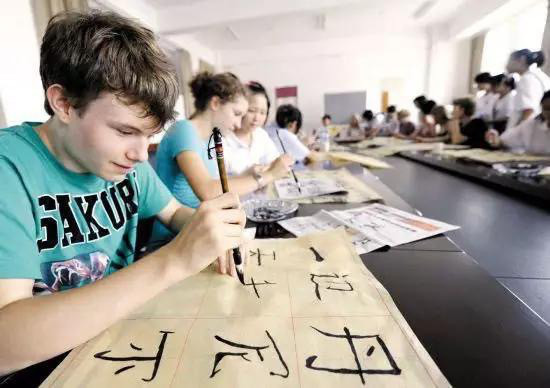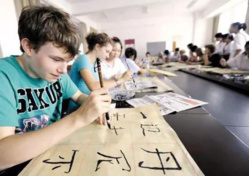By Li Yingyan from People’s Daily
Thanks to China’s increasing global influence, Mandarin has been introduced as a subject in more and more countries’ college entrance examinations as an elective foreign language.
Russia’s Federal Service for Supervision in Education and Science has finished technical preparation works and is planning to include Mandarin in the country's unified state exam as an elective foreign language, said Sergey Kravtsov, Deputy Minister of Education and Science of the Russian Federation.
The unified state exam, including 14 compulsory and obligatory subjects, is a series of exams every student must pass after graduation from high school to enter a university or a professional college. About 750,000 high school graduates take the exam annually.
Students selecting Mandarin as elective course are expected to take the national exam in 2019, Kravtsov said, adding that it took them three years to complete the preparation work, including technologies for written and oral tests, reference materials and talent reserves.
Germany, which adopts a two-year qualification process for college entrance, is also seeing more and more schools taking mandarin as the subject of foreign language in graduation exams. The number of students choosing Mandarin as elective foreign language is also on a rise.
Besides, Mandarin has been introduced as a subject in Ireland’s final examination in middle school system, according to a 10-year foreign language teaching strategy released by the Irish government in late 2017. Starting from 2020, Mandarin will be an optional course for middle school students in the country, and will become an exam subject in 2022.
In addition to being incorporated into the college entrance exam systems of foreign countries, Mandarin courses have also been offered in elementary and middle schools in many countries.
The UK government launched the “Mandarin Excellence Programme (MEP)” at the end of 2016, offering lessons taught in mandarin in state-funded secondary schools across England. With an investment of £10 million, the program aims to have 5,000 pupils on track towards fluency in Mandarin by 2020.
Now there are over 40,000 people studying Mandarin in Spain. Over 150 French universities and 700 French elementary or middle schools are offering Mandarin courses. The French Ministry of National Education has even designated general inspector of national education for Mandarin. In Italy, more than 30,000 registered students are learning Mandarin.
According to incomplete statistics, over 10.6 million people in the Republic of Korea (ROK), or 21% of the country’s population, are learning Mandarin and Chinese characters, topping the world. Each year, there are over 170,000 ROK residents taking the Chinese Proficiency Test (HSK), Young Learners Chinese Test (YCT) and other Chinese-related tests.
Chinese Director of the Confucius Institute in Islamabad Zhang Daojian introduced that the number of registered HSK candidates at each Confucius Institute across the country has exceeded 1,000.
Early in 2010, the UN has established the Chinese Language Day. At present, over 600 UN international employees and diplomats are studying Mandarin each year.
Pic:
A Russian student writes Chinese characters with Chinese calligraphy brush. (Photo from People’s Daily Online)
Russia’s Federal Service for Supervision in Education and Science has finished technical preparation works and is planning to include Mandarin in the country's unified state exam as an elective foreign language, said Sergey Kravtsov, Deputy Minister of Education and Science of the Russian Federation.
The unified state exam, including 14 compulsory and obligatory subjects, is a series of exams every student must pass after graduation from high school to enter a university or a professional college. About 750,000 high school graduates take the exam annually.
Students selecting Mandarin as elective course are expected to take the national exam in 2019, Kravtsov said, adding that it took them three years to complete the preparation work, including technologies for written and oral tests, reference materials and talent reserves.
Germany, which adopts a two-year qualification process for college entrance, is also seeing more and more schools taking mandarin as the subject of foreign language in graduation exams. The number of students choosing Mandarin as elective foreign language is also on a rise.
Besides, Mandarin has been introduced as a subject in Ireland’s final examination in middle school system, according to a 10-year foreign language teaching strategy released by the Irish government in late 2017. Starting from 2020, Mandarin will be an optional course for middle school students in the country, and will become an exam subject in 2022.
In addition to being incorporated into the college entrance exam systems of foreign countries, Mandarin courses have also been offered in elementary and middle schools in many countries.
The UK government launched the “Mandarin Excellence Programme (MEP)” at the end of 2016, offering lessons taught in mandarin in state-funded secondary schools across England. With an investment of £10 million, the program aims to have 5,000 pupils on track towards fluency in Mandarin by 2020.
Now there are over 40,000 people studying Mandarin in Spain. Over 150 French universities and 700 French elementary or middle schools are offering Mandarin courses. The French Ministry of National Education has even designated general inspector of national education for Mandarin. In Italy, more than 30,000 registered students are learning Mandarin.
According to incomplete statistics, over 10.6 million people in the Republic of Korea (ROK), or 21% of the country’s population, are learning Mandarin and Chinese characters, topping the world. Each year, there are over 170,000 ROK residents taking the Chinese Proficiency Test (HSK), Young Learners Chinese Test (YCT) and other Chinese-related tests.
Chinese Director of the Confucius Institute in Islamabad Zhang Daojian introduced that the number of registered HSK candidates at each Confucius Institute across the country has exceeded 1,000.
Early in 2010, the UN has established the Chinese Language Day. At present, over 600 UN international employees and diplomats are studying Mandarin each year.
Pic:
A Russian student writes Chinese characters with Chinese calligraphy brush. (Photo from People’s Daily Online)
 Menu
Menu
 Mandarin included in more and more countries’ college entrance exams
Mandarin included in more and more countries’ college entrance exams

















